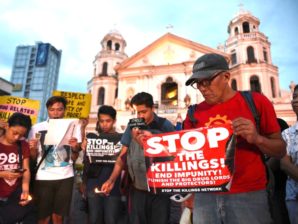Although taking on the dimensions of a rote exercise by now, Malacañang’s issuance of an official statement last Aug. 21 honoring Ninoy Aquino on the 34th year of his assassination and reminding the nation of his heroic place in the people’s fight for freedom, was commendable.
A bit of a surprise, in fact, given the general antipathy that has been directed at the Aquinos’ legacy by certain forces identified with President Duterte, who ran and won on a platform of change that promised a radical break from the conventions of the liberal democracy established after the Aquino-led People Power revolution of 1986.
But there it was — Mr. Duterte’s signature on words that unreservedly paid tribute to the opposition figure killed at high noon at the Manila International Airport tarmac — a brazen act of murder that would mark the beginning of the end of the Marcos dictatorship.
“Throughout his career,” the statement read, “[Ninoy] fought for what is right and just. Up until the very end of his life, he inspired a peaceful revolution that resulted in the liberties we enjoy today… His deeds have taught us that we should always aspire for the common good — even if one must go against the grain — and do what is necessary.”
Still, for what was a straightforward act of remembering a great Filipino’s sacrifice, a major counternarrative was mounted on social media in an apparent attempt to disparage Aquino’s memory.
A virtual flood of postings, suspicious for the similarity in tone, advanced a common argument: What exactly had Ninoy done? He was supposedly no hero, but a troublemaker whose very rabble-rousing forced Ferdinand Marcos to declare martial law; why even bother to remember him with laudatory words, much less a holiday? His so-called legacy — freedom and democracy after the toppling of the dictatorship — made life only worse for the Filipino, hence the “correction” now being done under the Duterte dispensation.
The abysmal ignorance of that position is one thing; the sheer vitriol that often accompanied its explication hinted at another methodical, deliberate campaign to further twist and muddle history, despite the trove of easily available evidence and testimony attesting to what really happened during the dark Marcos years.
And this is the worrying part: The revisionism appears to be working especially on the young, many of whom are wont to unthinkingly pine for a supposed “golden age” under the Marcos dictatorship — one with no traffic, no crime, no drug addicts, and no rallies.
The shadowy fabricators of this alternate history appear to have found their perfect targets — people with no memory at all of the struggles of those who came before them, whose blood and sacrifice helped rebuild the democratic space that is used so irresponsibly and sullied so wantonly today.
When Aquilino “Nene” Pimentel Jr., one of the last lions of the freedom movement, spoke a few days ago against the rash of extrajudicial killings under Mr. Duterte’s watch, he was likewise mercilessly mocked online, derided as old, out of touch and ready to be put to pasture.
Disrespecting elderly statesmen in this way reflects an insidious mindset that can only thrive in an environment of gross historical amnesia — the same lethal strain of forgetfulness that renders many Filipinos oblivious to, and unable to care about, the country’s heroic breed: its World War II veterans and martial law activists, for instance, as well as the men and women of our time who toil unheralded in the frontiers of social work, education, agriculture, etc.
But perhaps the Philippines is merely reaping the whirlwind of its own casual indifference toward learning from its past. The administrations after Edsa 1986 seem to have failed in teaching history right, and the larger society, too, must bear part of the blame for forgetting and forgiving too soon.
That collective memory gap is turning out to be far more dangerous and consequential than benign forgetfulness; now Philippine history, and its critical examples of heroism and patriotism, are under assault as well.


